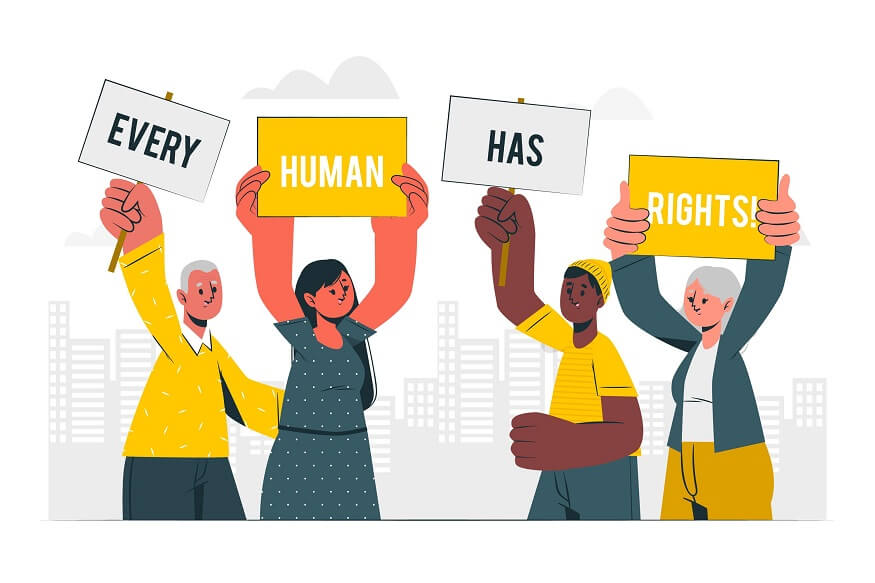Human rights have been the centre of activism for centuries. As the human race has evolved, awareness and demand for human rights have gained prominence. Human rights movements across generations have championed the cause of equality on aspects such as gender, race, religion, caste, and even equality of voting rights, gay rights, and democracy. Human rights movements have often challenged autocratic and fascist regimes and have been met with violence and oppression. While there have been numerous small and large human rights movements in world history, this article presents 9 such movements of significance that have altered human history and the formation of societies the world over.
Also Read: 10 interesting ways to learn history
1.Women’s suffrage
For centuries, women did not get the right to vote in political elections or suffrage. The movement demanding equal voting rights for women started in the USA and UK in the 19th century. New Zealand was the first country to give voting rights to women in 1893. The USA and UK for years refused to budge. Suffrage activists such as Emmeline Pankhurst led militant protests in the UK. The activists’ sustained effort led to the Representation of the People Act of 1918 which gave voting rights to all women above the age of 30 years. The USA followed suit and the 19th Amendment in 1920 gave voting rights to women.
2.The Civil Rights movement
While slavery ended in the USA in 1865, discrimination against blacks continued. The rights of black Americans, including their voting rights, were significantly curbed. Black Americans were segregated from whites in most public places such as restaurants, bars, schools, jobs, and even buses. While activists always resisted the muzzling of black people’s rights, the civil rights movement gathered pace during the 1950-60 era. In 1967, Martin Luther King Jr. emerged as a leader of prominence when he advocated human rights over and above civil rights. Events such as Rosa Parks refusing to give up her bus seat to a white man attracted global attention. Activists bravely suffered through violent oppression. The civil rights movement led to the passing of major resolutions to eliminate discrimination against black Americans. The Civil Rights Act of 1957 validated their voting rights. The Civil Rights Act of 1964 put an end to all forms of segregation. The Fair Housing Act of 1968 prevented discrimination in housing based on sex, race, national origin, and religion.
3.The anti-apartheid movement
The anti-apartheid movement led by Nelson Mandela in South Africa ended racism and discrimination against non-white South Africans. The apartheid system in South Africa forced non-whites to use separate public facilities, live in isolated areas, and get special permission to travel. There was a famous incident where Mahatma Gandhi was thrown out of a train compartment as it was exclusive to whites. Non-whites were not allowed to vote, participate in government, or marry white people. Nelson Mandela led a largely violent anti-apartheid movement. He was arrested and convicted of treason. Mandela’s movement gathered global sentiments and countries started putting trade sanctions on South Africa, including an arms embargo by the UN Security Council. South Africa even faced bans from participating in global sporting events such as cricket. The South African regime succumbed to this sustained global pressure. The apartheid was lifted, Nelson Mandela was released from jail, and a free and fair election was conducted. Nelson Mandela emerged as the first non-white President of South Africa. The anti-apartheid movement finally succeeded after a sustained struggle of 50 years.
4.The gay rights movement
The fight for LGBTQ+ rights has a long history globally. While many countries have now amended their laws, the fight for gay rights continues in various parts of the world. The earliest documented gay rights organisation can be traced to as far back as 1924. A few other organizations took shape as time went by but the life of gays continued to be difficult and full of oppression. Gay communities were frequently subjected to ridicule, and insult, were looked down upon, and even subjected to violence and hatred. In 1952, the American Psychiatric Association even declared homosexuality as a mental disorder. Eisenhower signed an executive order barring gays from any federal employment. Things began to change for the better in the 1960s when many states in the USA repealed sodomy laws. Illinois was the first to do so in 1961, and 21 other states followed suit in the 1970s and early 80s. The gay movement gathered steam and the first gay pride parade was held in 1970. Over the years, the gay rights movement saw minor victories. However, the AIDS response and gay marriage ban were still a bone of contention. It was as late as 2015 when the US Supreme Court legalized gay marriage. Even today there are only 34 countries in the world where gay marriages are legal.
Also Read: Indian History Chronology: Ancient India to Modern India
5.Ni Una Menos
The Ni Una Menos movement was prominent in Argentina but the sentiments were shared across many other countries, even India. Ni Una Menos translates to “Not One Less” which means not even a single female must be killed by a man purely because of her gender. Female foeticide is a prominent menace which plagued India for generations. The #NiUnaMenos movement kicked off in 2015 when the news of the murder of a female by her boyfriend went viral in Argentina. A crowd of 200,000 protestors gathered in Buenos Aires and at other town squares across Argentina. A similar other event of rape and murder of a teenager led to the Black Wednesday protest. Over the years, the Ni Una Menos movement agenda has expanded to include other important women’s rights such as better employment opportunities, an end to transphobia, and the right to abortion. The movement paid off in December 2020 when the National Congress legalised elective abortion up to the 14th week of pregnancy.
6.End Sars
In 1992, Nigeria created the police unit SARS to fight against violent crime, especially armed robbery. On the contrary, the Sars unit became notorious for rampant corruption, high-handedness, and violence. The #EndSARS first started trending in 2018 highlighting the abuses being carried out by the SARS unit at their whims and fancies. Minor restructuring by the government didn’t seem to help as the movement resurfaced in 2020 when a video of a SARS officer shooting a young man went viral. As the movement gathered momentum, more such vagaries saw the light of the day. The Nigerian police force came out strongly to muzzle the protestors, even opening fire on the protesting crowd. The videos of mass shootings which reportedly led to 49 fatalities shook the conscience of people across the world.The movement is still on with more than 40 protestors in jail without a trial.
7.Black Lives Matter
The Black Lives Matter movement has been one of the most recent movements that caught the conscience of people the world over. The movement was triggered in 2013 when George Zimmerman killed a Black and unarmed 13-year-old boy Trayvon Martin. More than the murder of a young black child, it was the trial and eventual acquittal of Zimmerman that aroused angry emotions amongst all and sundry. The subsequent murders of Michael Brown and Eric Garner added fuel to the fire and further spiked the movement. Gradually the Black Lives Matter movement emerged as a global social media movement against police brutality against blacks. It again surged into prominence with George Floyd’s brutal murder in 2020. The protests that ensued reminded me of the civil rights movement in American history.The movement is still on and off as cases of police brutality against black Americans still frequent the news sections.
Also Read: Top 10 Archaeological sites around India
8.Anti Colonial Protests
The fight for independence from colonialism was one of the earliest forms of human rights movement in the history of the world. The Indian struggle for independence from 200-plus years of oppressive British Raj is a testament to the movement for freedom and self-rule as the most basic human right. Popular history dates the movement as far back as the 1847 uprising led by sepoy Mangal Pande, finally culminating in the Indian independence in 1947.
9.The Hong Kong democracy movement
Hong Kong, like India, was a British colony till 1997 when it was returned to China. Hong Kong blamed China for violating their basic rights which led to the emergence of this movement. China though has managed to effectively crush the democratic movement. China is reported to have imposed laws that give it powers to install troops in Hong Kong and even influence the trial of national security cases. Jimmi Lai, one of the founders of this movement is potentially facing life imprisonment, which his supporters claim is politically motivated.










